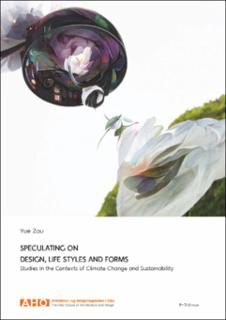| dc.description.abstract | This thesis explores a speculative, nondualist and relational design approach to engaging with ongoing climate change and sustainable design transformations. Posthumanism, amongst other theories, has attempted to use nondualist views and relational thinking to reconfigure nonbinary futures and deal with the challenges of the Anthropocene, which was formulated to address human activities with unsustainable consequences for survivable futures. Designers and design researchers have adopted future-oriented perspectives on and approaches to ecological crises. Such speculative design inquiry challenges the earlier techno-determinist and extractivist economic models to which design has contributed by problematising and shaping our understanding of the complexity of climate change from sociotechnical and cultural perspectives. However, future-oriented design theories largely lack relational conceptualisations and practices of sustainability. If we seek a fundamental change in design towards long-term sustainability, we must address nondualism and relational thinking in design theory and practice.
This thesis argues for an Eco-Cultural-Techno Design Speculative Approach to understanding the problems and potentials of long-term sustainable transformations. It presents a practice-based design speculative inquiry and related processes for designing Eco-Cultural-Techno futures. The research considers posthumanist notions and practices of Life Forms and Life Styles, encompassing nonbinary, nondualist, non-anthropocentric views and relational thinking. Based on this emergent viewpoint on posthumanism, Life Forms and Life Styles, the research consists of two heuristic and speculative design studies that offer critiques of the field of cosmetics and consumer culture through two projects, LO and XIANGVEI, that explore alternative conceptualisations and new relationships of design-based Eco-Cultural-Technofutures. Structurally, the study takes the format of an article-based thesis bound together by an exegesis.
The thesis offers three overarching contributions to design research. The first is a conceptual approach based on design-centred, posthumanist notions of Life Forms and Life Styles to investigate Eco-Cultural-Techno futures for transitioning to long-term sustainability. It also offers a Speculative Life-Style-Form Design Perspective through which this Approach may be read in greater depth. Second, the thesis demonstrates the design-inflected possibilities of multisensory and cooperative futures that could contribute to rethinking and supporting longterm sustainability. Third, the inquiry indicates that practice-based investigations through speculative design may highlight and elevate the potential to facilitate plural spaces for sustainable transitions. The thesis closes with a discussion of the possible directions for future
research, including making connections between imagination, climate change and design and the means of implementing these ideas in design research, education, culture and policy. | |
